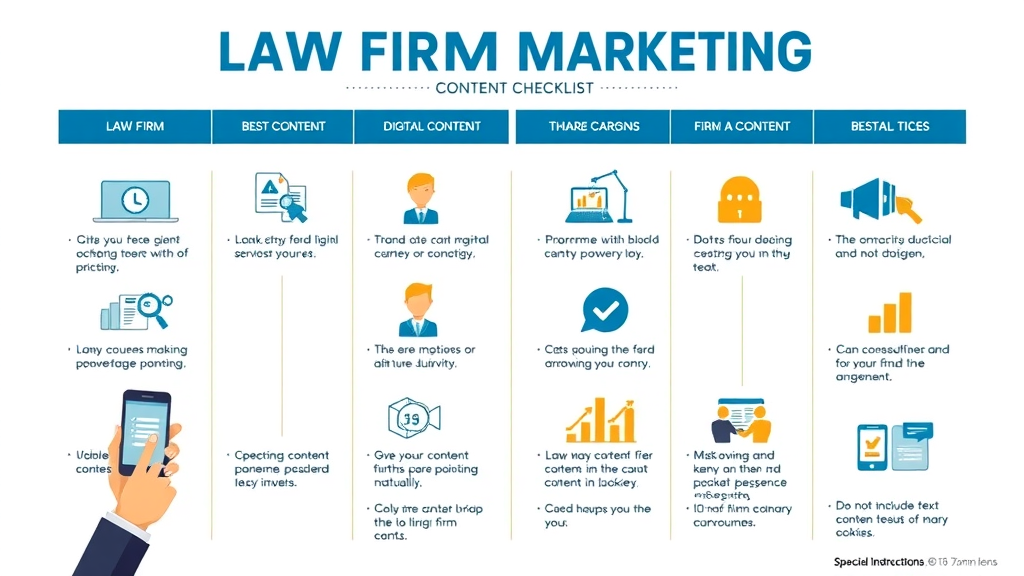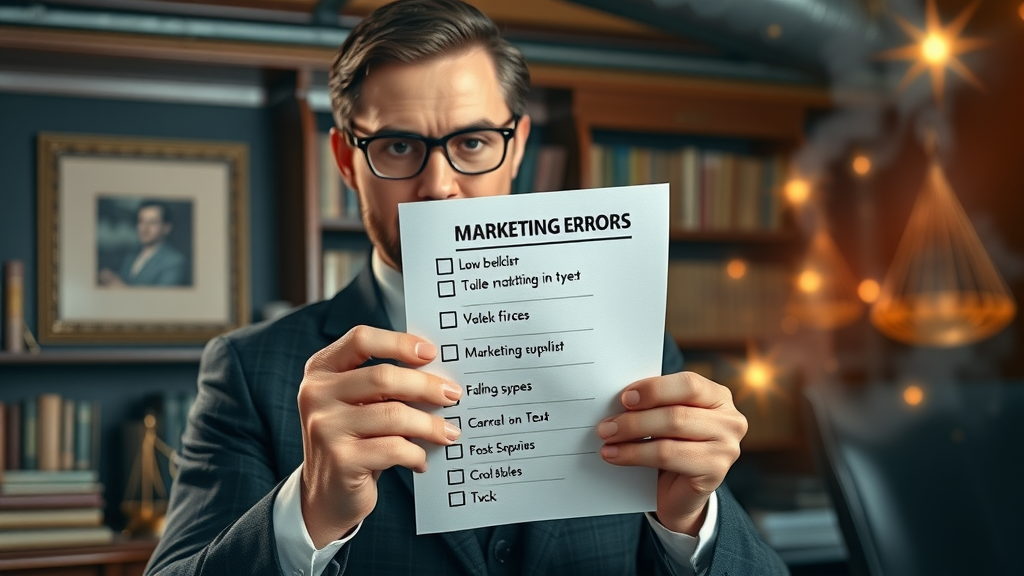"A recent survey revealed that nearly 70% of law firms admit to having no documented content marketing strategy—resulting in wasted resources and missed client opportunities."
The legal market is more competitive than ever, and the difference between a thriving law firm and one that struggles for clients often comes down to how well you market your practice online. If you think simply having a website is enough, think again—most law firms are making critical content marketing mistakes that drive potential clients straight into the hands of their competitors. In this comprehensive listicle, you’ll discover the most common mistakes law firms make, why these errors damage your reputation and client base, and, most importantly, how to avoid them for a more successful digital presence.

Why Identifying Content Marketing Mistakes for Law Firms Matters
- Discover why content marketing mistakes for law firms can significantly impact your reach, reputation, and bottom line. Written for attorneys, marketers, and firm managers seeking marketing success.
Understanding and avoiding content marketing mistakes for law firms is crucial for maintaining a competitive edge in today’s digital landscape. Law firms that overlook their online messaging or fail to tailor their firm marketing strategies often find themselves missing out on valuable prospective clients. Legal professionals invest time and resources into content writing , yet a single common mistake —like ignoring SEO or neglecting audience needs—can dramatically reduce traffic to your website and undermine your firm’s authority.
For law firms, content isn’t just a marketing tool ; it’s a critical part of building trust, clarifying areas of legal services , and establishing thought leadership. Ignoring potential pitfalls in content marketing can erode your reputation and diminish your ability to acquire and retain your ideal client . Given that search engine results drive much of today’s client discovery, firms who sidestep these errors are set to outperform their competition and grow their client base .

Understanding the Legal Market and Law Firm Marketing Challenges
- Explore how the competitive legal market and evolving digital presence heighten the risks and consequences of making content marketing mistakes for law firms.
The legal market is saturated with firms vying for the same clients and cases. With evolving technology, law firms now face challenges such as rapidly changing search engine algorithms, new online platforms, and a target audience whose expectations are shaped by digital experiences. In this environment, even a single poorly planned content strategy can create gaps for competitors to fill.
Another hurdle is maintaining consistency in your digital presence , which includes your website, blogs, and social media profiles. When your messaging doesn’t align across these channels, it confuses and discourages potential clients. Many law firms also struggle to balance compelling legal content with compliance and professional ethics, making it tempting to stick with generic—or outdated—content rather than innovating and refining their marketing plan .

What You'll Gain from Learning Content Marketing Mistakes for Law Firms
- How to spot and correct common marketing mistakes law firm professionals repeat
- Proven solutions to improve your law firm marketing strategy
- Tactics to strengthen your firm's legal content, attract your ideal client, and boost your search engine ranking
By recognizing the most frequent content marketing mistakes for law firms , you’ll be better prepared to craft compelling and effective legal content . Not only will you better serve your ideal client , but you’ll also set your law firm up to build deeper trust, outperform rivals in search engines , and attract a broader potential client base. In the sections ahead, we offer a detailed breakdown of these mistakes—along with actionable solutions—so your law firm can harness the full power of content marketing .
| Law Firms With Effective Content Marketing | Law Firms Without Effective Content Marketing |
|---|---|
|
|

34 Content Marketing Mistakes for Law Firms—and How to Avoid Them
1. Neglecting a Targeted Content Marketing Strategy in Law Firms
Many law firms make the mistake of producing content without a clear marketing strategy in place. Without a plan, your efforts lack direction, and you won’t be able to measure what's working for your target audience or practice areas. Focus your content writing on clear goals and regularly review your approach to ensure it aligns with your business objectives. Adopting a documented content marketing strategy will help your firm attract more potential clients and set benchmarks for continual improvement.
For example, a personal injury law firm may post blogs sporadically on unrelated legal topics, missing the opportunity to become a trusted source in their field. Instead, identify your ideal client and tailor your content strategy accordingly. This way, your law firm's website becomes a funnel directing precisely the right potential client to your legal services.
2. Ignoring Your Ideal Client When Planning Legal Content
A crucial content marketing mistake for law firms is creating legal content that fails to address the needs and pain points of your ideal client . If your content isn’t relevant to the potential client you want to attract, your efforts will be wasted, and your message will miss the mark. Start every content writing session by asking, “What does my ideal client need to know about this practice area?”
Law firm marketing that focuses on the client’s perspective will perform better in search engines , as practical, answered questions gain more traction. Use analytics and feedback to continually refine your approach—ensuring your target audience sees your law firm as a problem-solver for their unique legal issues.
3. Overlooking Search Engine Optimization in Law Firm Marketing
Failing to leverage SEO is a significant content marketing mistake for law firms. Ignoring important elements like meta descriptions, keywords, and quality links means your legal content won’t be found by search engines —and by extension, your potential clients . SEO is essential for improving your visibility, driving traffic to your website , and staying ahead of competitors.
Effective law firm marketing weaves search engine optimization into every page. This includes using keywords specific to each practice area , employing structured data, and continually adapting as algorithms change. SEO is not a one-time task—it takes time and ongoing effort to maintain online relevance.
4. Creating Generic Legal Content Instead of Practice Area-Specific Content
Producing broad, unfocused legal articles is a common pitfall that reduces your authority and makes it difficult for clients searching for specialized help to find you. Every law firm has one or more practice areas where they shine—your content should do the same. Focused topics not only build trust with your client base , but also signal to search engines which services you’re best at providing.
For instance, if your law firm focuses on estate planning, your content writing should reflect deep expertise in that area. By providing answers to pressing estate planning questions, your law firm will stand out among competitors with generic pages that feel more like filler than information.
5. Failing to Regularly Update Your Digital Presence and Content Writing Efforts
Out-of-date content and a static online presence send a message to prospective clients that your firm isn’t active or innovative. Regular updates are key to both user engagement and strong search engine performance. Refresh your blogs, attorney bios, and service pages frequently to reflect the latest legal changes and firm successes.
A dynamic digital presence also helps reinforce your reputation and optimizes the customer journey, ensuring every interaction feels current and relevant. Make routine audits part of your marketing plan to stay ahead of the competition.
6. Not Leveraging Social Media for Legal Marketing Impact
Social media is a powerful channel for building brand awareness and engaging with your target audience , yet many law firms underutilize it or avoid it altogether. This oversight means missed opportunities for client interaction, peer networking, and content distribution.
Building a strong legal marketing presence on platforms like LinkedIn or Facebook not only increases the reach of your legal content but also humanizes your practice—a must for today’s consumers who value relatable firm marketing . Don’t just broadcast—be ready to engage and provide educational value, not only promotional messages.
"Your content is only effective if your target audience can find and engage with it."
7. Producing Content Without a Consistent Marketing Plan
Without a clear and consistent marketing plan , it’s easy for law firms to fumble content schedules, duplicate efforts, or publish off-brand messaging. Sporadic or inconsistent publishing damages your credibility and makes building authority much harder.
Create an editorial calendar to organize topics, assign deadlines, and ensure regular output tailored to your target audience and practice area priorities. Use analytics to measure effectiveness, testing various topics and formats to see what resonates most with potential clients.

8. Overlooking the Importance of Visuals in Law Firm Content Marketing
Visual content—infographics, photos, and videos—enhances your legal content, making information more digestible and memorable for your target audience. Many law firms focus solely on text, missing opportunities to reinforce their message or illustrate legal concepts effectively.
Including professionally designed graphics relevant to your practice area increases engagement, helps break up long passages of text, and can serve as shareable assets for social media . In today’s crowded digital landscape, compelling visuals are a must-have part of any law firm marketing strategy.
9. Not Measuring Marketing Efforts and Results
If you never track what’s working, you’ll repeat the same marketing mistakes . It’s essential to set KPIs for your content writing campaigns—such as traffic, leads, and engagement—and to use platforms like Google Analytics to measure them consistently.
Data-driven content strategy helps law firms identify which practice areas deserve more attention and which marketing tools are underperforming. Regular reporting enables continual refinement for maximum ROI.
10. Missing Out on Social Proof and Client Testimonials in Legal Content
Social proof builds credibility. Including positive client testimonials, reviews, and case studies in your law firm marketing not only supports your claims but also reassures potential clients that others have found success with your legal services.
Make these stories a prominent part of your online presence—not as afterthoughts, but as integral conversion tools that address skepticism and strengthen trust.
Key Content Marketing Mistakes Law Firms Make—A Detailed Breakdown
- Not adjusting content writing strategy for evolving search engine algorithms
- Publishing irregular content, damaging your law firm marketing authority
- Ignoring local SEO and the impact on search engines
- Failing to connect with the target audience on relevant topics
Law firms commonly overlook the need to tailor content for evolving search engines , leading to lost visibility and market share. Local SEO, in particular, is critical for practices serving specific geographic areas. Failing to embrace locally relevant keywords and directory listings makes it difficult for searchers to find your firm marketing site, weakening your authority and online presence .
Another frequent error is publishing content that’s irrelevant—or too infrequent—to consistently engage your target audience . Firm marketing thrives on regular, meaningful interaction; neglecting this erodes trust and damages your reputation. Always strive to understand and address the interests of your potential clients —it’s the backbone of effective law firm marketing.
Over time, search engines reward those who adapt and penalize those who neglect user intent, local relevance, or technical requirements. Routinely review and adjust your content strategy to preserve your authority and ranking.

20. Inconsistency Between Your Digital Presence and Offline Brand
If your law firm's digital persona doesn’t match your offline brand values and client experience, it creates confusion and distrust. Ensure your website tone, images, and messaging all align with the professional standards your office practices every day.
Regular internal audits involving both legal and marketing staff can help reconcile discrepancies and present a united, trustworthy image to your target audience .
Avoid These Additional Content Marketing Mistakes for Law Firms
- Publishing content not aligned with law firm business objectives
- Over-promoting and under-educating—the practice area trap
- Neglecting call-to-actions in marketing efforts
- Overlooking technical SEO essentials
- Failing to monitor and engage with social media responses
- Relying solely on one type of content format and channel
- Ignoring the analytics of your content marketing performance
- Neglecting content marketing's impact on client decision-making
These classic content marketing mistakes for law firms can be tough to spot if you lack regular content audits and a robust feedback loop. For instance, failing to include powerful call-to-actions means lost conversion opportunities, while ignoring new content channels keeps your firm boxed into outdated practices. Experiment with formats—like videos, webinars, or podcasts—to reach today’s digitally savvy clients and improve your overall firm marketing.
Remember, every piece of legal content and every marketing effort should support your firm's big-picture goals and deliver clear value to your potential clients .

21. Failing to Document and Learn from Marketing Mistakes
It’s not enough to spot errors—you must create a process for recording what worked, what didn’t, and why. A documented review process builds institutional memory and prevents repetition of costly mistakes in content writing or marketing strategy.
After every campaign or initiative, gather your team, analyze the results, and implement actionable lessons into your law firm marketing plan.
22. Lacking a Content Distribution Strategy for the Legal Market
Producing great legal content is only half the battle. Without a plan to distribute it through the right channels—be it social media , email newsletters, or legal directories—your efforts may go unseen by your target audience .
Identify where your ideal clients spend their time and focus your distribution for maximum impact.
23. Avoiding Collaboration Between Attorneys and Marketing Teams
Silence between attorneys and marketing staff leads to missed messaging opportunities and inconsistent branding. Encourage open, ongoing collaboration—bring legal knowledge and marketing creativity together for high-value, compliant, and effective firm marketing .
Shared ownership over content writing makes for richer, more relevant legal insights and more persuasive messaging.
24. Overlooking the Role of Email in Law Firm Marketing
Email remains a preferred channel for business communications. Underusing it leaves you missing a valuable direct connection to current clients and prospects. Use targeted newsletters, legal updates, and drip campaigns to stay top-of-mind and nurture leads through your marketing funnel.
Always segment your lists by practice area or client interest so that each message feels tailored and highly relevant.
25. Ignoring Google Business Profile Updates for Law Firms
A fully optimized Google Business Profile (GBP) is crucial for local search visibility. Failing to keep it current with accurate information, reviews, posts, and images can hinder prospects from discovering or trusting your law firm.
Set reminders to regularly review and enhance your GBP—this small step delivers outsized returns in building local authenticity.
26. Publishing Content Without a Clear Audience or Practice Area Goal
Content that tries to appeal to everyone rarely resonates with anyone. Define each article’s intended audience and specific practice area outcome before you begin writing. Doing so will make your firm marketing more targeted and impactful.
When every piece is tailored, search engines better understand your expertise, improving both relevance and rankings.
27. Not Reviewing Your Competitor's Search Engine Success
If your competitors routinely outrank you, it’s time to study their strategies. Use competitive analysis to identify which topics, formats, and keywords deliver strong results so you can refine your own content writing and marketing strategy.
Consistent benchmarking keeps your law firm marketing fresh and ahead of the curve.
28. Failing to Repurpose Successful Content for Maximum Reach
One well-performing blog post can be turned into a video, infographic, or series of social media snippets. Law firms that ignore content repurposing leave valuable traffic and engagement on the table.
Repurpose high-impact assets to extend their shelf life and gain new audiences for your legal content.
29. Not Addressing Negative Reviews or Comments in Digital Presence
Ignoring negative feedback, whether on Google, Facebook, or niche review sites, implies that you don’t care about client experiences. Proactively address concerns—professionally and empathetically—to build trust and showcase your commitment to legal service quality.
Online reputation management should be part of every law firm marketing plan.
30. Undervaluing Professional Legal Content Writing and Editing
Your reputation is on the line with every piece you publish. Amateurish writing, grammar errors, or lack of editing make your firm look sloppy and untrustworthy. Professional content writing and editing ensures your legal content is accurate, persuasive, and compliant.
Hire or consult with experienced writers who understand the nuances of legal topics and marketing.
31. Forgetting to Update Call-to-Actions for Your Target Audience
A call-to-action should be specific, compelling, and tailored to each page’s primary audience and intent. Outdated or generic CTAs can tank conversion rates and confuse potential clients .
Review your CTAs every quarter to keep them natural and effective for your evolving client base.
32. Underestimating the Power of Niche Practice Area Content Marketing
Highly specific, niche topics have less competition and attract more qualified leads. Don’t be afraid to go deep—focus on underserved topics within your firm’s core practice areas for maximum marketing impact.
This strategy distinguishes your law firm as a leader, not just a participant, in the legal market.
33. Lack of an Ongoing Training Program for Law Firm Marketing Teams
Marketing is not static—both digital tactics and search engine rules perpetually evolve. Without ongoing education, your marketing efforts will stagnate. Create a regular training calendar for everyone involved in your law firm marketing, ensuring consistent quality and innovation.
This investment pays dividends through continuous improvement and the prevention of repeated mistakes.
34. Not Having a Crisis Plan for Content or Marketing Mistakes
Mistakes happen, but lack of preparation magnifies them. Prepare a crisis communication plan for content errors, PR incidents, or negative reviews before you actually need one. Train your team so they can react quickly to protect your digital presence and reputation.
Crisis readiness is a hallmark of mature, proactive law firm marketing departments.

People Also Ask About Content Marketing Mistakes for Law Firms
What are the biggest content marketing mistakes for law firms?
- The top mistakes include lack of strategy, outdated content, failure to leverage SEO, not analyzing results, and ignoring newer channels like social media and video.

How can law firms improve their legal content marketing strategy?
- Law firms can improve by defining their ideal client, regularly reviewing analytics, integrating multiple content types, and staying current with legal and marketing trends.
Why do law firms struggle with content writing and digital presence?
- Challenges often arise due to lack of in-house expertise, insufficient marketing plans, or underestimating the importance of consistent, high-quality legal content.
What is the impact of poor firm marketing on a law firm's reputation?
- Poor marketing damages authority, reduces client trust, and negatively impacts search engine rankings, ultimately limiting client growth potential.
Frequently Asked Questions on Content Marketing Mistakes for Law Firms
-
Can small law firms compete online with strategic content marketing?
Yes. With focused topics, smart SEO, and clear messaging tailored for their target audience, even a small firm can build trust and authority in search results. -
What role does client feedback play in preventing marketing mistakes?
Client feedback reveals gaps in content and highlights opportunities for improvement, helping your firm create more relevant, compelling legal content. -
How do you measure legal content marketing ROI?
Track metrics like website traffic, leads generated, rankings, and retention rates—these offer insight into how content marketing impacts your bottom line.
Actionable Steps to Overcome Content Marketing Mistakes for Law Firms
- Regularly audit all content for accuracy and relevance to practice area.
- Develop an adaptable law firm marketing strategy focused on your target audience and ideal client.
- Use analytics to continually refine your marketing efforts and avoid repeat marketing mistakes.
Get Expert Advice on Fixing Content Marketing Mistakes for Law Firms
- Learn more: visit pugetsoundinjurylaw.com/
Ready to build a powerful digital presence? Focus on your ideal client, optimize every legal content piece, and never stop refining your law firm marketing strategy.
To enhance your understanding of content marketing pitfalls in the legal industry, consider exploring the following resources:
-
“15 Costly Marketing Mistakes Law Firms Make” : This article outlines common errors such as neglecting integration across marketing channels and underutilizing visual content, providing actionable solutions to improve your firm’s marketing strategy. ( growwithqs.com )
-
“Content Marketing Mistakes Law Firms Make (and How to Avoid Them)” : This piece delves into issues like creating content without a clear strategy and neglecting SEO best practices, offering insights to refine your content marketing approach. ( fullfunnel.co )
By reviewing these resources, you’ll gain valuable perspectives on common content marketing mistakes and learn strategies to enhance your law firm’s digital presence.
 Add Row
Add Row  Add
Add 


Write A Comment